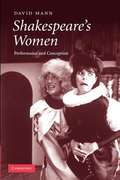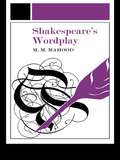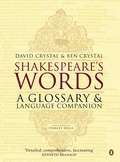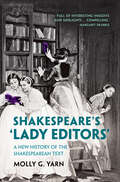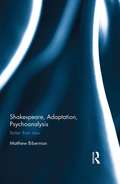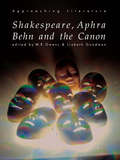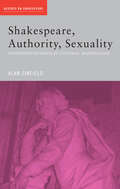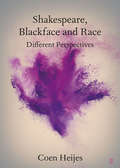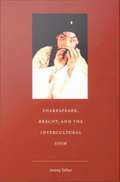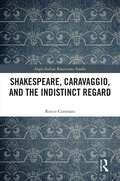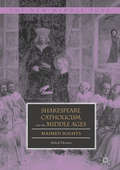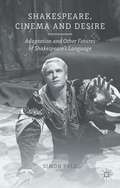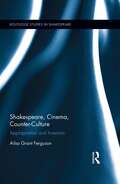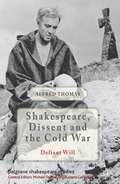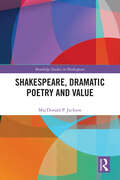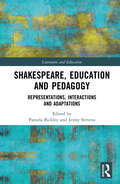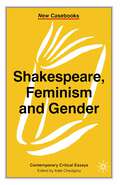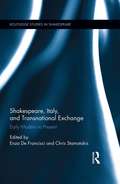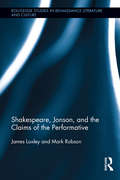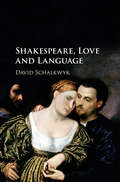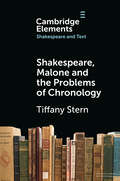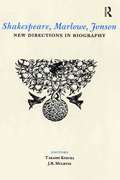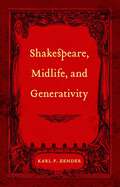- Table View
- List View
Shakespeare's Women: Performance and Conception
by David MannDavid Mann examines the influence of the Elizabethan cross-dressed tradition on the performance and conception of Shakespeare's female roles through an analysis of all 205 extant plays written for the adult theater. The study provides both an historical context, showing how performance practice developed in the era before Shakespeare, and a comparative one, in revealing how dramatists in general treated their female characters and the influence their characterization had upon Shakespeare's writing. The book challenges many views of the sexual ethos of Elizabethan theater, offering instead a picture of Shakespeare which pays less attention to his supposed gender politics and more to his ability to exploit the cross-dressed convention as a dramatic medium. By challenging the gay and polemical feminist accounts that currently dominate the treatment of Elizabethan cross-dressing, the book restores its importance as a mainstream performance topic for academics and students.
Shakespeare's Wordplay
by M. M. Mahood`Professor Mahood's book has established itself as a classic in the field, not so much because of the ingenuity with which she reads Shakespeare's quibbles, but because her elucidation of pun and wordplay is intelligently related both to textual
Shakespeare's Words: A Glossary and Language Companion (Canto Classics Ser.)
by David Crystal Ben CrystalA vital resource for scholars, students and actors, this book contains glosses and quotes for over 14,000 words that could be misunderstood by or are unknown to a modern audience. Displayed panels look at such areas of Shakespeare's language as greetings, swear-words and terms of address. Plot summaries are included for all Shakespeare's plays and on the facing page is a unique diagramatic representation of the relationships within each play.
Shakespeare's ‘Lady Editors': A New History of the Shakespearean Text
by Molly G. YarnThe basic history of the Shakespearean editorial tradition is familiar and well-established. For nearly three centuries, men – most of them white and financially privileged – ensconced themselves in private and hard-to-access libraries, hammering out 'their' versions of Shakespeare's text. They produced enormous, learnèd tomes: monuments to their author's greatness and their own reputations. What if this is not the whole story? A bold, revisionist and alternative version of Shakespearean editorial history, this book recovers the lives and labours of almost seventy women editors. It challenges the received wisdom that, when it came to Shakespeare, the editorial profession was entirely male-dominated until the late twentieth century. In doing so, it demonstrates that taking these women's work seriously can transform our understanding of the history of editing, of the nature of editing as an enterprise, and of how we read Shakespeare in history.
Shakespeare, Adaptation, Psychoanalysis: Better than New
by Matthew BibermanIn Shakespeare, Adaptation, Psychoanalysis, Matthew Biberman analyzes early adaptations of Shakespeare’s plays in order to identify and illustrate how both social mores and basic human psychology have changed in Anglo-American culture. Biberman contests the received wisdom that Shakespeare’s characters reflect essentially timeless truths about human nature. To the contrary, he points out that Shakespeare’s characters sometimes act and think in ways that have become either stigmatized or simply outmoded. Through his study of the adaptations, Biberman pinpoints aspects of Shakespeare’s thinking about behavior and psychology that no longer ring true because circumstances have changed so dramatically between his time and the time of the adaptation. He shows how the adaptors’ changes reveal key differences between Shakespeare’s culture and the culture that then supplanted it. These changes, once grasped, reveal retroactively some of the ways in which Shakespeare’s characters do not act and think as we might expect them to act and think. Thus Biberman counters Harold Bloom’s claim that Shakespeare fundamentally invents our sense of the human; rather, he argues, our sense of the human is equally bound up in the many ways that modern culture has come to resist or outright reject the behavior we see in Shakespeare’s plays. Ultimately, our current sense of 'the human' is bound up not with the adoption of Shakespeare’s psychology, perhaps, but its adaption-or, in psychoanalytic terms, its repression and replacement.
Shakespeare, Alchemy and the Creative Imagination
by Margaret HealyShakespeare's Sonnets and A Lover's Complaint constitute a rich tapestry of rhetorical play about Renaissance love in all its guises. A significant strand of this is spiritual alchemy: working the 'metal' of the mind through meditation on love, memory work and intense imagination. Healy demonstrates how this process of anguished soul work - construed as essential to inspired poetic making - is woven into these poems, accounting for their most enigmatic imagery and urgency of tone. The esoteric philosophy of late Renaissance Neoplatonic alchemy, which embraced bawdy sexual symbolism and was highly fashionable in European intellectual circles, facilitated Shakespeare's inscription of an interior drama of a desiring mind creating poetry. Arguing that Shakespeare's incorporation of alchemical textures throughout his late works is indicative of an artistic stance promoting religious toleration and unity, this book sets out a crucial new framework for interpreting the 1609 poems, and transforms our understanding of Shakespeare's art.
Shakespeare, Aphra Behn and the Canon (Approaching Literature #Bk. 3)
by Lizbeth Goodman W.R. OwensA clear introduction to the idea of the canon, exploring the process by which certain works, and not others, receive high cultural status. The work of Shakespeare and Aphra Behn is used to illustrate and challenge this process.
Shakespeare, Authority, Sexuality: Unfinished Business in Cultural Materialism (Accents on Shakespeare)
by Alan SinfieldShakespeare, Authority, Sexuality is a powerful reassessment of cultural materialism as a way of understanding textuality, history and culture, by one of the founding figures of this critical movement. Alan Sinfield examines cultural materialism both as a body of ongoing argument and as it informs particular works by Shakespeare and his contemporaries, especially in relation to sexuality in early-modern England and queer theory. The book has several interlocking preoccupations: theories of textuality and reading the political location of Shakespearean plays and the organisation of literary culture today the operation of state power in the early-modern period and the scope for dissidence the sex/gender system in that period and the application of queer theory in history. These preoccupations are explored in and around a range of works by Shakespeare and his contemporaries. Throughout the book Sinfield re-presents cultural materialism, framing it not as a set of propositions, as has often been done, but as a cluster of unresolved problems. His brilliant, lucid and committed readings demonstrate that the ‘unfinished business’ of cultural materialism - and Sinfield’s work in particular - will long continue to produce new questions and challenges for the fields of Shakespeare and Renaissance Studies.
Shakespeare, Blackface and Race: Different Perspectives (Elements in Shakespeare Performance)
by Coen HeijesThis Element addresses the topical debate on blackface, race and Othello. With Shakespeare performance studies being rather Anglo-centric, the author explores how this debate has taken a radically different course in the Netherlands, a country historically perceived as tolerant and culturally close to the UK. Through several case studies, including the Van Hove Othello of 2003/2012 and the latest, controversial 2018/2020 Othello, the first main house production with a black actor as Othello, the author analyses the interaction between blackface and (institutional) racism in Dutch society and theatre and how Othello has become an active player in this debate.
Shakespeare, Brecht, and the Intercultural Sign
by Antony TatlowIn Shakespeare, Brecht, and the Intercultural Sign renowned Brecht scholar Antony Tatlow uses drama to investigate cultural crossings and to show how intercultural readings or performances question the settled assumptions we bring to interpretations of familiar texts. Through a "textual anthropology" Tatlow examines the interplay between interpretations of Shakespeare and readings of Brecht, whose work he rereads in the light of theories of the social subject from Nietzsche to Derrida and in relation to East Asian culture, as well as practices within Chinese and Japanese theater that shape their versions of Shakespearean drama. Reflecting on how, why, and to what effect knowledges and styles of performance pollinate across cultures, Tatlow demonstrates that the employment of one culture's material in the context of another defamiliarizes the conventions of representation in an act that facilitates access to what previously had been culturally repressed. By reading the intercultural, Tatlow shows, we are able not only to historicize the effects of those repressions that create a social unconscious but also gain access to what might otherwise have remained invisible. This remarkable study will interest students of cultural interaction and aesthetics, as well as readers interested in theater, Shakespeare, Brecht, China, and Japan.
Shakespeare, Caravaggio, and the Indistinct Regard (Anglo-Italian Renaissance Studies)
by Rocco CoronatoThis volume presents a contrastive study of the overlapping careers of Shakespeare and Caravaggio through the comparison of their strikingly similar conventional belief in symbol and the centrality of the subject, only to gradually open it up in an exaltation of multiplicity and the "indistinct regard" (Othello). Utilizing a methodological premise on the notions of early modern indistinction and multiplicity, Shakespeare, Caravaggio, and the Indistinct Regard analyses the survival of English art after iconoclasm and the circulation of Italian art and motifs, methodologically reassessing the conventional comparison between painting and literature. The book examines Caravaggio’s and Shakespeare’s works in the perspective of the gradual waning of symbolism, the emergence of chiaroscuro and mirror imagery underneath their radically new concepts of representation, and the triumph of multiplicity and indistinction. Furthermore, this work assesses the validity of the twin concepts of multiplicity and indistinction as an interpretive tool in a dialectical interplay with much recent work on indeterminacy in literary criticism and the sciences.
Shakespeare, Catholicism, and the Middle Ages: Maimed Rights (The New Middle Ages)
by Alfred ThomasWhereas traditional scholarship assumed that William Shakespeare used the medieval past as a negative foil to legitimate the present, Shakespeare, Catholicism, and the Middle Ages offers a revisionist perspective, arguing that the playwright valorizes the Middle Ages in order to critique the oppressive nature of the Tudor-Stuart state. In examining Shakespeare’s Richard II, The Merchant of Venice, Hamlet, King Lear, Macbeth, and The Winter’s Tale, the text explores how Shakespeare repossessed the medieval past to articulate political and religious dissent. By comparing these and other plays by Shakespeare’s contemporaries with their medieval analogues, Alfred Thomas argues that Shakespeare was an ecumenical writer concerned with promoting tolerance in a highly intolerant and partisan age.
Shakespeare, Cinema and Desire
by Simon RyleShakespeare, Cinema and Desire explores the desires and the futures of Shakespeare's language and cinematographic adaptations of Shakespeare. Tracing ways that film offers us a rich new understanding of Shakespeare, Simon Ryle highlights issues that are central to both Shakespeare and film: media technologies, narrative territories and flows, mourning and loss, the voice, the body, sexuality and gender. The recirculation of Shakespearean ideas in the critical theory of modernity, especially figures such as Jacques Lacan, Maurice Blanchot, Jacques Derrida, and Gilles Deleuze, parallels the negotiations of film adaptation. By focusing on the dialogue between Shakespeare and modernity, this study explores how Shakespeare film adaptation raises broad questions concerning the emancipatory potential of aesthetics. Shakespeare is the source of more movie screenplays than any other writer in history, and negotiations between Shakespeare and developing cinematic technologies have been influential across the history of cinema. This book contributes a much needed analysis of the relation of Shakespeare's language to film form, providing in-depth studies of major Shakespeare adaptations from directors such as Akira Kurosawa, Peter Greenaway, Joseph Mankiewicz, Grigori Kozintsev, Svend Gade, Jean-Luc Godard, and Laurence Olivier.
Shakespeare, Cinema, Counter-Culture: Appropriation and Inversion (Routledge Studies in Shakespeare #17)
by Ailsa Grant FergusonAddressing for the first time Shakespeare’s place in counter-cultural cinema, this book examines and theorizes counter-hegemonic, postmodern, and post-punk Shakespeare in late 20th and early 21st century film. Drawing on a diverse range of case studies, Grant Ferguson presents an interdisciplinary approach that offers new theories on the nature and application of Shakespearean appropriations in the light of postmodern modes of representation. The book considers the nature of the Shakespearean inter-text in subcultural political contexts concerning the politicized aesthetics of a Shakespearean ‘body in pieces,’ the carnivalesque, and notions of Shakespeare as counter-hegemonic weapon or source of empowerment. Representative films use Shakespeare (and his accompanying cultural capital) to challenge notions of capitalist globalization, dominant socio-cultural ideologies, and hegemonic modes of expression. In response to a post-modern culture saturated with logos and semiotic abbreviations, many such films play with the emblematic imagery and references of Shakespeare’s texts. These curious appropriations have much to reveal about the elusive nature of intertextuality in late postmodern culture and the battle for cultural ownership of Shakespeare. As there has yet to be a study that isolates and theorizes modes of Shakespearean production that specifically demonstrate resistance to the social, political, ideological, aesthetic, and cinematic norms of the Western world, this book expands the dialogue around such texts and interprets their patterns of appropriation, adaptation, and representation of Shakespeare.
Shakespeare, Computers, and The Mystery of Authorship
by Arthur F. Kinney Hugh CraigCraig, Kinney and their collaborators confront the main unsolved mysteries in Shakespeare's canon through computer analysis of Shakespeare's and other writers' styles. In some cases their analysis confirms the current scholarly consensus, bringing long-standing questions to something like a final resolution. In other areas the book provides more surprising conclusions: that Shakespeare wrote the 1602 additions to The Spanish Tragedy, for example, and that Marlowe along with Shakespeare was a collaborator on Henry VI, Parts 1 and 2. The methods used are more wholeheartedly statistical, and computationally more intensive, than any that have yet been applied to Shakespeare studies. The book also reveals how word patterns help create a characteristic personal style. In tackling traditional problems with the aid of the processing power of the computer, harnessed through computer science, and drawing upon large amounts of data, the book is an exemplar of the new domain of digital humanities.
Shakespeare, Dissent, and the Cold War
by Alfred ThomasShakespeare, Dissent and the Cold War is the first book to read Shakespeare's drama through the lens of Cold War politics. The book uses the Cold War experience of dissenting artists in theatre and film to highlight the coded religio-political subtexts in Hamlet, King Lear, Macbeth and The Winter's Tale.
Shakespeare, Dramatic Poetry and Value (Routledge Studies in Shakespeare)
by MacDonald P. JacksonThis book redirects attention to a truth largely ignored by recent criticism—that Shakespeare’s excellence as a playwright is inextricable from his excellence as a poet. It explores the diverse means by which Shakespeare’s poetry enriches his drama, illustrating how particular words in a particular order render his dialogue distinctive and create supreme literary and dramatic value. By examining many passages, long and short and from a variety of Shakespeare’s plays—comedies, histories, tragedies, later plays—the author aids understanding of the poetic effects that make Shakespeare preeminent. His analyses, alert to textual variants and cruxes, are illuminated by comparisons: Shakespeare’s early verse is compared with his later verse and samples of Shakespearean dialogue are compared with versions in later adaptations, in modernizations, and inferior quarto texts, as well as with contributions by his co-authors to collaborative plays. The contrasts throw into relief the surpassing vitality and expressiveness of Shakespeare’s own language. Since the rhythmic vitality of Shakespeare’s verse is essential to how and what it communicates, an appendix on the principles of iambic pentameter is included to support those aspects of the analyses that refer to acoustic subtleties.
Shakespeare, Education and Pedagogy: Representations, Interactions and Adaptations (Literature and Education)
by Pamela Bickley Jenny StevensThis volume captures the diverse ways in which Shakespeare interacts with educational theory and practice. It explores the depiction of learning and education in the plays, the role of Shakespeare as pedagogue, and ways in which the teaching of Shakespeare can facilitate discussion of some of the urgent questions of modern times. The book offers a wide range of perspectives – historical, theoretical, theatrical. The Renaissance humanist learning underpinning Shakespeare’s own work is explored in essays that consider how the complexity of Shakespeare’s drama challenges early-modern pedagogical orthodoxies. From close analysis of individual, solitary reflection on Shakespeare’s writing, the book moves outward to engage with contemporary social issues around inclusivity, society, and the planet, demonstrating the many educational contexts in which Shakespeare is currently appropriated. Engaging with current questions of the value of literary study, the book testifies to the potentialities of an empowering Shakespearean pedagogy. Bringing together voices from a variety of institutions and from a wide range of educational perspectives, this volume will be essential reading for academics, researchers and post-graduate students of Shakespeare, literature in education, pedagogy and literary theory.
Shakespeare, Feminism and Gender (New Casebooks)
by Kate ChedgzoyOver the last quarter-century, feminist criticism of Shakespeare has greatly expanded and enriched the range of interpretations of the Shakespearean texts, their original historical location, and subsequent reinterpretation. Characteristically it weaves between past and present, driven by a commitment both to intervene in contemporary cultural politics and to recover a fuller sense of the sexual politics of the literary heritage. Collecting together essays which offer detailed accounts of particular plays with others that take a broader overview of the field, this Casebook showcases the range of critical strategies used by feminist criticism, and illustrates how vital attention to the politics of gender and sexuality is to a full understanding and appreciation of Shakespearean drama.
Shakespeare, Italy, and Transnational Exchange: Early Modern to Present (Routledge Studies in Shakespeare)
by Enza De Francisci Chris StamatakisThis interdisciplinary, transhistorical collection brings together international scholars from English literature, Italian studies, performance history, and comparative literature to offer new perspectives on the vibrant engagements between Shakespeare and Italian theatre, literary culture, and politics, from the sixteenth to the twenty-first century. Chapters address the intricate, two-way exchange between Shakespeare and Italy: how the artistic and intellectual culture of Renaissance Italy shaped Shakespeare’s drama in his own time, and how the afterlife of Shakespeare’s work and reputation in Italy since the eighteenth century has permeated Italian drama, poetry, opera, novels, and film. Responding to exciting recent scholarship on Shakespeare and Italy, as well as transnational theatre, this volume moves beyond conventional source study and familiar questions about influence, location, and adaptation to propose instead a new, evolving paradigm of cultural interchange. Essays in this volume, ranging in methodology from archival research to repertory study, are unified by an interest in how Shakespeare’s works represent and enact exchanges across the linguistic, cultural, and political boundaries separating England and Italy. Arranged chronologically, chapters address historically-contingent cultural negotiations: from networks, intertextual dialogues, and exchanges of ideas and people in the early modern period to questions of authenticity and formations of Italian cultural and national identity in the eighteenth and nineteenth century. They also explore problems of originality and ownership in twentieth- and twenty-first-century translations of Shakespeare’s works, and new settings and new media in highly personalized revisions that often make a paradoxical return to earlier origins. This book captures, defines, and explains these lively, shifting currents of cultural interchange.
Shakespeare, Jonson, and the Claims of the Performative: Shakespeare, Jonson, And The Claims Of The Performative (Routledge Studies in Renaissance Literature and Culture #22)
by Mark Robson James LoxleyThis book will constitute an original intervention into longstanding but insistently relevant debates around the significance of notions of ‘performativity’ to the critical analysis of early modern drama. In particular, the book aims to: show how the investigation of performativity can enable readings of Shakespeare and Jonson that challenge the dominant methodological frameworks within which those plays have come to be read; demonstrate that the thought of performativity does not come to rest in the simplicity of method or instrumentality, and that it resists its own claim that language and action might be understood as unproblematically instrumental; demonstrate that this self-resistance occurs or takes place as a moment in the process of articulating the claims of the performative, and that this process is itself in an important sense dramatic.
Shakespeare, Love and Language
by David SchalkwykWhat is the nature of romantic love and erotic desire in Shakespeare's work? In this erudite and yet accessible study, David Schalkwyk addresses this question by exploring the historical contexts, theory and philosophy of love. Close readings of Shakespeare's plays and poems are delivered through the lens of historical texts from Plato to Montaigne, and modern writers including Jacques Lacan, Jean-Luc Marion, Ludwig Wittgenstein, Jacques Derrida, Alain Badiou and Stanley Cavell. Through these studies, it is argued that Shakespeare has no single or overarching concept of love, and that in Shakespeare's work, love is not an emotion. Rather, it is a form of action and disposition, to be expressed and negotiated linguistically.
Shakespeare, Malone and the Problems of Chronology (Elements in Shakespeare and Text)
by Tiffany SternIn 1778 Edmond Malone published his first contribution to Shakespeare scholarship, An Attempt to Ascertain the Order in which the Plays Attributed to Shakspeare were Written. He revised and republished it in 1790 and began a further revision of it which was printed posthumously in 1821. This Element will be on the three versions of Malone's Attempt and the way they created, shaped, focused, directed, and misdirected, our idea of the chronology and sequence of Shakespeare's plays. By showing Malone's impressive, fallible choices, adopted or adapted by later editors, it reveals how current Shakespeare editions are, in good and bad ways, Malonian at heart.
Shakespeare, Marlowe, Jonson: New Directions in Biography
by J. R. Mulryne Takashi KozukaA remarkable resurgence of interest has taken place over recent years in a biographical approach to the work of early modern poets and dramatists, in particular to the plays and poems of Shakespeare, Marlowe and Jonson. The contributors to this volume approach the topic in a manner that is at once critically and historically alert. They acknowledge that the biographical evidence for all three authors is limited, thus throwing the emphasis acutely on interpretation. In addition to new scholarship, the essays are valuable for their awareness of the challenges posed by recent redirections of critical methodology. Scepticism and self-criticism are marked features of the writing gathered here.
Shakespeare, Midlife, and Generativity: A Biography
by Karl F. ZenderThe life expectancy in Shakespearean times averaged only about twenty-five to thirty-five years, but those who survived the illnesses of infancy and childhood could look forward to a long life with nearly the same level of confidence as someone living now. But even so long ago, some faced conflicts in their middle and later years that remain familiar today. In Shakespeare, Midlife, and Generativity, Karl F. Zender explores William Shakespeare's depictions of middle age by examining the relationships between middle-aged parents -- mainly fathers -- and their children in five of his greatest plays. He finds that the middle-aged characters in King Lear, Macbeth, Antony and Cleopatra, The Winter's Tale, and The Tempest -- much like their modern counterparts -- experience a fear of aging and debility.Representations of middle age occur throughout the Shakespearean canon, in forms ranging from Jaques' "seven ages" speech in As You Like It to the emphasis -- almost an obsession -- in many plays on relations between the generations. Lear, Zender shows, tries to forestall the approach of old age with a fantasy of literal rebirth in his relationship with Cordelia. Macbeth depicts an even more urgent struggle against midlife decline, while in Antony and Cleopatra, Shakespeare portrays two characters in midlife crisis who attempt to redefine their identities by memorializing their former status and power, now lost. Drawing on Erik Erikson's theory of generativity -- a midlife shift from advancing one's own career to aiding a younger generation -- Zender explores the difficulties Shakespeare's characters face as they transfer power and authority to their children and others in the next generation. Paying careful attention to the plays' moral and ethical implications, he demonstrates how Shakespeare's innovative depiction of the midlife experience focuses on internal psychological understanding rather than external actions such as ceremony and ritual.Illuminating and engaging, Shakespeare, Midlife, and Generativity offers a fresh analysis of several of Shakespeare's most important plays and explores a profound, centuries-old perspective on the challenges inherent in middle age.
